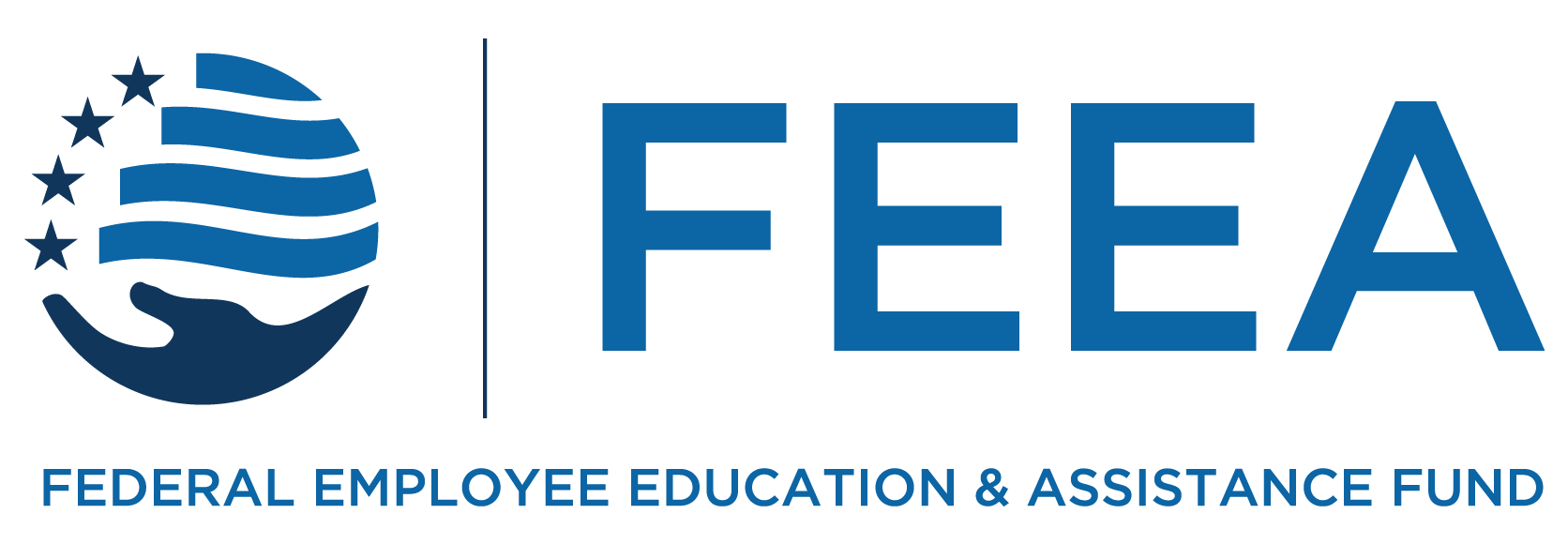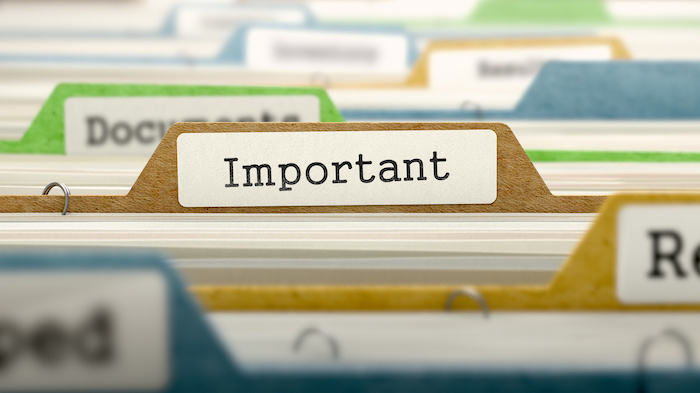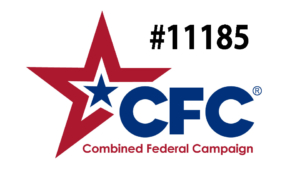by Joyce Warner and Tony Zerante
FEDLIFEHACKS Keeping Important Documents Safe
[Video Start]
[Video presented with written slides in English]
[music]
[FEEA #FEDLIFEHACKS logo with a light bulb at the top encased by a blue box.]
Are Your Important Documents Safe?
[An image of a man sitting on a couch in a home, water is up to his ankles and he is going through documents while holding a phone.]
Do you have an emergency plan for your most important family documents?
Take a few minutes this weekend to gather your documents and make sure they’re safely stored.
[An image of a cardboard box overflowing with paper documents.]
Consider a small safe or other secure storage box
A shoebox, folder on your desk, or other unsecure storage will NOT keep your documents safe
[an image of an open safe with a passport, Will, and bank notes]
A waterproof/fireproof box at home and/or a safe deposit box at a bank are the best ways to store important documents and other items.
[An image of an insurance company real estate contract and other assorted documents
Many official documents are still on paper
Keep things like the deed to your home, will, and other notarized documents in your protected box.
[An image of random numbers on a documents
Keep a list of important accounts and info
Bank account numbers, insurance policies, immunization records, and other important information can be collected in one document and stored securely.
[An image of an open safe deposit box with jewelry.]
Consider keeping sentimental items safe
Family photos, sentimental or heirloom jewelry, and other collectibles might also belong in your secure storage or a safe deposit box.
for more information on this topic, visit feea.org/important-docs
[WAEPA Logo.]
FEEA thanks WAEPA for contributing to our #FedLifeHacks program
[FEEA #FEDLIFEHACKS logo with a light bulb at the top encased by a blue box.]
[music]
[Video End]
No one wants to think the worst — that they will be the victim of a house fire, major storm, burst pipe that floods their home, or other disaster. Hopefully, you will never be faced with this type of tragedy, but we recommend that everyone take a few minutes this weekend to gather and develop an emergency plan for their most important family documents, just in case.
Where will you store them?
As you develop your emergency documents plan, remember to consider where you will store your documents. A fire-safe box that locks and is stored off the floor (aka on a higher shelf) is going to give you a lot more protection than a shoebox under your bed. These types of secure document boxes range in price and we’ve seen them as low as $25 for a small one, though larger ones and those also rated waterproof can be considerably more. Check the box to see how long it is rated to withstand fire and/or water and make the choice that works best for where you’ll be keeping it. If you need to evacuate for an approaching storm, everything will be in one place to gather.
You might also want to consider storing key originals in a bank safe deposit box. According to a 2018 New York Times article, safe deposit boxes can range from $20-$200 a year depending on size, but you may be able to shop around and get one for free from a local bank you do business with.
It’s important to have a plan for a back-up set of print and electronic documents. Will you keep a set of electronic copies in secure cloud file storage? Or keep the originals at the bank and copies in a firebox at home?
ORIGINALS
While more and more official documentation is coming in electronic format, there are still a fair number of items for which you will need the paper originals for certain transactions. That’s not to say many of these can’t be replaced, but many will take time and money to replace and if you are recovering from a tragedy — or just need them for a transaction.
Original Documents
- Birth Certificates
- Car/Boat/RV Titles
- Death Certificates
- Home Deeds
- Immigration and Naturalization Cards
- Keys (like to your bank safety deposit box, extra car keys, etc.)
- Marriage Licenses
- Military ID
- Paper Savings Bonds or Original Stock Certificates
- Passports
- Social Security Cards
- Wills and Other Estate Documents
- Anything else on thick watermarked paper and/or with a raised seal/notarized signature.
Important Reference Numbers and Documents
This includes all the items that are not “originals” but that you will need in case of an emergency. For all of these, include the names of the institutions, phone numbers, and URLs for the account/policy issuer if you are not storing an original statement or policy document with that information on it. Also, if you keep other cards not mentioned above in your purse or wallet, make a copy for this file.
Reference Documents
- Checking and savings account numbers
- Credit card account numbers
- Insurance policies (life, disability, car, home, boat, medical, etc.)
- Immunization records
- Lists of doctors and prescriptions for each person in the family
- Location of off-site bank safety deposit boxes
- Military Discharge Paperwork
- Mortgage account number(s)
- Retirement/investment account numbers
Sentimental Items
Often after a tragedy, victims realize they have lost their most sentimental items. Consider keeping the items that have the most meaning to you in in your home fire protection and/or bank safety deposit box.
Sentimental Items
- A sampling of old family photos and/or their negatives and videos. If you are storing all your family photos digitally on a home computer, consider making a second copy on a thumb drive for your box and/or putting copies in secure cloud storage
- Sentimental or heirloom jewelry
- Collectable coins
So take a few moments this weekend, print out this list, and start pulling everything together. Hopefully you will never need it, but it will bring you some peace of mind.
Subscribe to FEEA’s Newsletter
FEEA THANKS WAEPA FOR CONTRIBUTING TO OUR #FEDLIFEHACKS PROGRAM
The information provided in this piece is for your convenience and informational purposes only and not to be construed as professional advice. FEEA and its coauthors and sponsors are not liable for any losses or damages related to actions or failure to act with regard to the content in this piece.
Would you like to reprint this piece in your agency human resource, federal employee association, or union local newsletter? You can do so at no cost by contacting admin@feea.org with your request.





